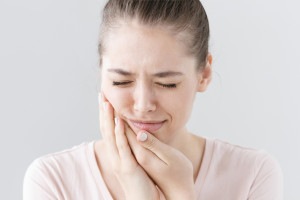What cankers sores are
Canker sores are not cold sores. They are ulcers of the mouth, specifically on the inner lining of your lips, on your gums, on your cheeks and under your tongue. They are painful little suckers that remind you how acidic some of your favorite foods and beverages are. Because when those foods and beverages seep into the sore, stinging pain is usually followed by cringing and tearing.
Anyone can get a canker sore but some unfortunate folks inherit the tendency to get them regularly. They are not contagious and they are not cold sores or fever blisters, open sores typically on the outside of the mouth that blister and scab thanks to the herpes virus that spreads easily by contact.
Here are some fun facts:
- 20% of Americans get canker sores
- No one knows why women get them more than men
- The average canker sore is ¼-inch wide
- The average canker sore goes away in a week
- 87% of canker sores did not vote in the last Presidential election
OK, one of those is silly, but is still actually true if you add another 13%.
Why you get canker sores
Although the actual cause of canker sores is technically not known, we know that certain things correlate highly with their appearance. Some are obvious, some are not:
- Trauma—A punch to the mouth, a bite of the lip, a blast of super hot food, etc. These traumatic events rip lining and make you susceptible to canker sores. The medical world calls them traumatic canker sores because these sores are categorically different than so-called aphthouse canker sores.
- Stress—Both physical and emotional stress (Is there really a difference?) are highly correlated with the presence of canker sores.
- Certain foods—Acidic foods and food with gluten are suspects in the cause of canker sores, too.
- Toothpaste—Although 5 out of 5 dentists don’t want you to stop brushing your teeth, we also know the data shows that certain toothpastes cause canker sores. The most likely culprit is the ingredient sodium lauryl sulfate (SLS). SLS is the agent that makes your toothpaste foamy when applied by brushing. It helps get your teeth clean. The good news is that there are a number of toothpastes on the market that clean your teeth just fine without this ingredient. And, this ingredient is always listed on packaging, so next time you’re at the store, read the label.
How you can prevent canker sores
You can’t.
However, some canker sore susceptible folks have said that changing their toothpaste had all but eliminated canker sores from their life. Meanwhile, you can make life with them more tolerable with these remedies:
- Rinsing with salt water and keeping your mouth clean and void of acidic foods.
- Lasers! Yes, there are procedures dentists can do using lasers that numbs the pain almost instantly.
Canker sores, on the spectrum of dental conditions, are pretty benign. However, there are some situations where you should seek immediate consult from your dentist or doctor:
- Fever
- Unusually large sores
- Sores that are spreading or lasting 3+ weeks
- So much pain that you are having difficulty drinking enough fluid or eating food








Leave a Reply